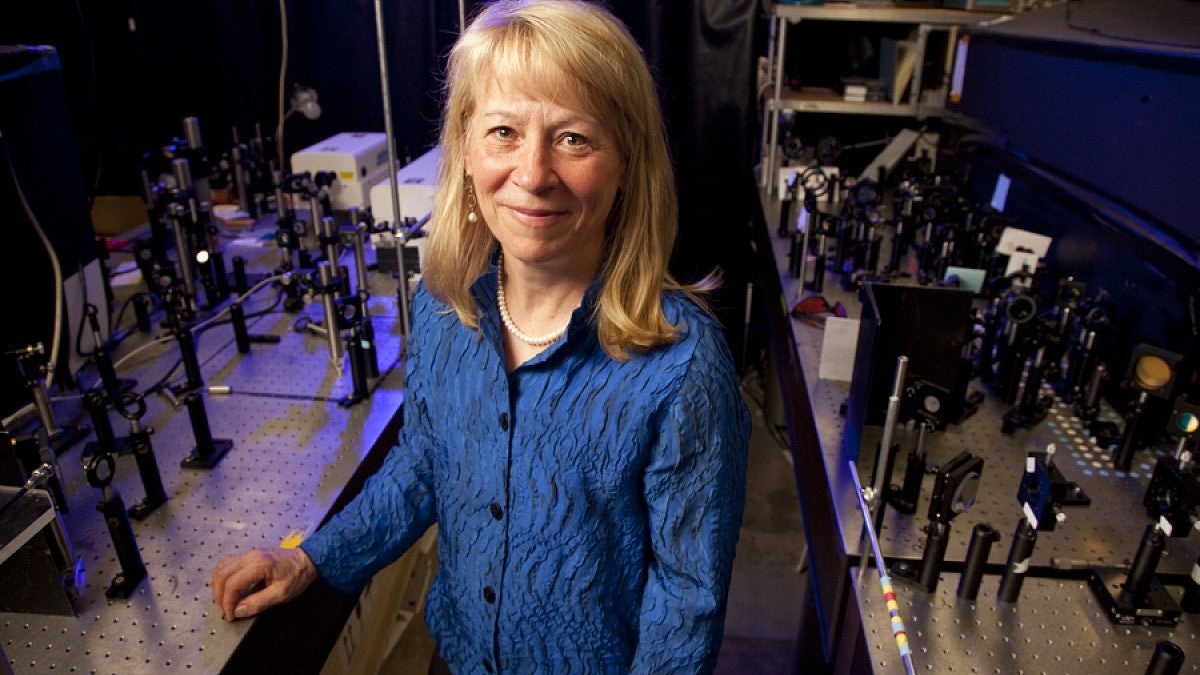Barely a year after getting the National Medal of Science, Geri Richmond has been selected to receive the 2018 Priestley Medal, the highest honor of the American Chemical Society, in recognition of her research and global outreach.
“I'm excited, and I’m honored,” said Richmond, the UO’s Presidential Chair in Science. “I’m honestly quite stunned. The Priestley Medal has honored so many remarkable chemists over the years. I am thrilled to be able to join that list of renowned and dedicated scientists in my field.”
Particularly gratifying, she said, is having followed in the footsteps of her doctoral mentor, George C. Pimentel, at the University of California, Berkeley. He won the Priestley Medal in 1989.
“I remember him winning it and thinking what a wonderful way to honor his efforts, especially since he was known for both his scientific chops and his giving back to the community,” she said. “His research and his decision to be involved on a national level in science policy issues have been a guiding light for me.”
Richmond will officially receive the medal during the American Chemical Society’s national meeting in March 2018 in New Orleans.
“We congratulate Professor Richmond on this tremendous and well-deserved honor,” said David Conover, the UO’s vice president for research and innovation.
“This lifetime achievement award comes at a time when she continues to distinguish herself, as a chemist, as an educator and as an advocate for science,” he said. “Through it all, she has continued to work tirelessly to increase the number and success of women scientists around the world and made a global impact on her field.”
The Priestley Medal was established in 1923 by the American Chemical Society to recognize groundbreaking chemists. The annual award includes a gold medallion commemorating the work of Joseph Priestley, who discovered a gas in 1774 that later became known as oxygen.
Richmond is widely known for her research on how molecules stick to the surface of water and how such bonding is altered when in contact with oils, dispersants, surfactants and gaseous pollutants. Her work has had implications for many biological and environmental processes.
Her research — funded by the National Science Foundation and U.S. Department of Energy — has depended heavily on the many students she has helped educate. A lot of them, she noted, have gone on to forge their own careers in academic and industrial positions.
With the support of UO leadership, she said, she also has been allowed to pursue her passions for serving people outside the lab.
“I don’t know of another university where I could have pulled this off,” Richmond said. “The University of Oregon has given me the flexibility to pursue both my science and my global outreach with minimal barriers.”
In 1998, she co-founded the Committee on the Advancement of Women Chemists — a grassroots organization now known simply as COACh — that encourages women to pursue science and reach success as scientists and engineers.
Today, COACh is involved in programming around the world with support from the National Science Foundation, U.S. Department of Energy and National Institutes of Health.
“There are people who know me exclusively for my science, and there is a segment of people who know me exclusively for my COACh activities,” Richmond said. “The Priestley Medal is nice because both roles are recognized together.”
Her work globally also includes her role, since 2014, as a U.S. State Department science envoy for much of Southeast Asia, serving nations along the Mekong River. Her next trip in that role will be in July, when she visits two Indonesian countries. She also is active in the U.S. Agency for International Development.
“Side projects are often seen as distracting from the science and have been particularly damaging for women,” she said. “Winning the Priestley Medal sends a message to the many younger women who are really struggling with wanting to have a complete professional life by doing great science and also doing more than that. This, to me, is a validation that it is OK to do that.”
Richmond’s career has included multiple honors, including her election in 2011 into the National Academy of Sciences. The same year the American Chemical Society named her a fellow and gave her the Joel Henry Hildebrand Award for her work on the chemistry of liquids.
In 2012, she was named to the National Science Board, where she remains active in science policy matters.
In February, she ended a three-year leadership role in the American Association for the Advancement of Science, as the organization’s president-elect, president and chair of the board of directors.
Her educational efforts also remain focused on the Presidential Undergraduate Research Scholars program, now in its third year, and the Research Experience for Undergraduates program, a National Science Foundation-supported summer initiative that has been active since Richmond founded it 30 years ago.
Richmond received a bachelor’s degree in chemistry in 1975 from Kansas State University and a doctorate in chemical physics in 1980 from the University of California, Berkeley.
For more about Richmond, see the story about her National Medal of Science in May 2016.
—By Jim Barlow, University Communications


